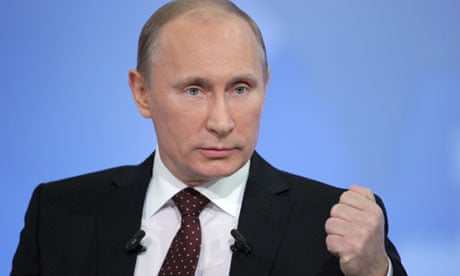Vladimir Putin brushed off complaints of election fixing during his annual televised live chat with the nation on Thursday , but behind the scenes his lieutenants are anxiously plotting how to quell rising discontent.
Putin claimed during the phone-athon that he was "cheered" by the sight of tens of thousands of Russians flooding on to the streets of Moscow and other major cities on 10 December to express their disgust at rigged elections the previous weekend. "That gratifies me and if it's the result of 'Putin's regime', then that's good – I'm glad that such people have appeared," said the prime minister.
Yet in Kremlin and government corridors, say analysts, there is growing disquiet over the wave of dissent washing over the country. A new protest in Moscow has been approved for December 24. Its organisers hope to carry momentum through to the presidential election in March, for which Putin is the chief contender.
While the 59-year-old ex-KGB officer still wields immense power, his falling ratings could make it tricky for him to get 50% of the vote and retake the Kremlin in the first round of the poll.
There is scant chance, however, that the ruling cabal will respond to protesters' anger over reported ballot-stuffing in favour of the pro-Kremlin United Russia party at the parliamentary vote on December 4.
"What you have to grasp is that the Kremlin, and Putin in particular, deeply despise public opinion," said Dmitry Oreshkin, a Moscow-based political analyst, in a telephone interview. "They think that politics is done by strong people and strong elite groups; that the protesters are just sheep. And the most important thing is to isolate their leaders, the people who bring them on to the streets.
"In Putin's view, these leaders need to be frightened, or bought off, or destroyed, or discredited, or threatened with legal measures."
Several protest leaders, including the blogger Alexei Navalny and the young activist Ilya Yashin, are already serving 15-day sentences in jail. More "denial of service" attacks on liberal websites and a continued blacklisting of undesirables from state television are expected in order to deny exposure to the dissenters.
"Putin will act as he knows how, with changes in the mechanism of power to get tougher managers into his ruling team who will effect these measures, to remove the opponents from public attention," said Oreshkin. The first signs of such a tightening of control came on Thursday as Vladislav Surkov, the shadowy Kremlin fixer, was promoted to acting presidential chief of staff.
Some commentators suggest Putin's circle could yet turn to violence in order to quell the protests. Andrew Wilson, an expert on Russian spin-doctoring at University College London, expects a subtler approach. "They know that a hardline response now would be a mistake and cause a backlash," he said. Instead, the Kremlin will concentrate on creating a "plausible but not too disloyal opposition" in a Machiavellian mock-up of true political rivalry.
The principal actor of this shadowplay is expected to be Mikhail Prokhorov [below], the billionaire tycoon who announced his candidacy for the presidential election on 12 December.
Prokhorov clashed with his handlers in September when he resigned from the leadership of the Kremlin-finessed Right Cause party, claiming Surkov was a cynical "puppet master".
Yet many are deeply sceptical of the tycoon's claim to be an independent force. At the official launch of his campaign at a Moscow university this morning he greeted several hundred supporters and promised that if he became president he would pardon the jailed oligarch, Mikhail Khodorkovsky.
He expressed sympathy for the street protesters – whom he did not join – but gave little sign of a man entering a political maelstrom in search of victory. Asked by the Guardian to characterise Putin, his main rival in the upcoming presidential race, Prokhorov said only: "Putin is a strong opponent and I am not afraid of him."
Wilson said he doubted the billionaire's credentials. "Why would a rich guy like Prokhorov risk his business interests?" he said. "There's nothing in his past biography that indicates he would tilt at windmills."
He added: "The interesting question now is whether the mood in Moscow and St Petersburg has changed so much that it has leapfrogged over these semi-plausible opposition figures. The public seems to be looking for something more. Managed democracy is becoming less and less manageable."
Oreshkin predicted the presidential election campaign would be "scandalous". "I doubt they will put people in prison again, but they may do so if they sense things getting out of control," he said. "Contempt toward the authorities is growing. The situation is volatile."





